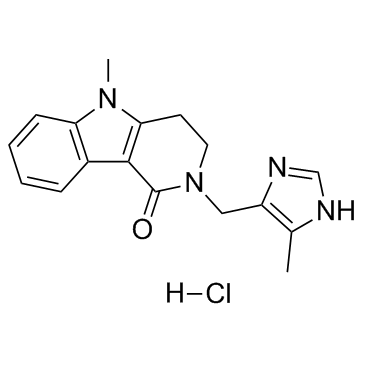Effects of serotonin 5-HT(3) receptor antagonists on CRF-induced abnormal colonic water transport and defecation in rats.
Takuya Hirata, Yoshihiro Keto, Mari Nakata, Asako Takeuchi, Toshiyuki Funatsu, Shinobu Akuzawa, Masao Sasamata, Keiji Miyata
Index: Eur. J. Pharmacol. 587(1-3) , 281-4, (2008)
Full Text: HTML
Abstract
The effects of corticotropin releasing factor (CRF) and serotonin (5-HT)(3) receptor antagonists on intestinal water transport are not well understood. Hence, we established a CRF-induced abnormal water transport model in rat colon, and evaluated the effects of 5-HT(3) receptor antagonists including ramosetron, alosetron, and cilansetron, and the antidiarrheal agent loperamide, in this model. In addition, the effects of 5-HT(3) receptor antagonists and loperamide on abnormal defecation induced by CRF in rats were examined. Colonic water transport was measured in colonic loops in conscious rats. Centrally administered CRF (3-30 microg/kg) markedly decreased colonic fluid loss, whereas oral administration of ramosetron (3, 30 microg/kg), alosetron (300 microg/kg), cilansetron (300 microg/kg), or loperamide (3 mg/kg) significantly inhibited it. Ramosetron (1-10 microg/kg), alosetron (10-100 microg/kg), cilansetron (10-100 microg/kg), or loperamide (0.3-3 mg/kg) also showed dose-dependent inhibition of CRF-induced defecation in rats. These results suggest that 5-HT(3) receptors are involved in both abnormal colonic water transport and defecation induced by CRF, and that the inhibitory effects of 5-HT(3) receptor antagonists on CRF-induced abnormal defecation partly result from their ameliorating action on colonic water transport.
Related Compounds
| Structure | Name/CAS No. | Molecular Formula | Articles |
|---|---|---|---|
 |
Alosetron hydrochloride
CAS:122852-69-1 |
C17H19ClN4O |
|
In silico binary classification QSAR models based on 4D-fing...
2010-07-26 [J. Chem. Inf. Model. 50(7) , 1304-18, (2010)] |
|
Quantitative benefit-risk assessment using only qualitative ...
2012-01-01 [Med. Decis. Making 32(6) , E1-15, (2012)] |
|
Clinical trials in irritable bowel syndrome: a review.
2013-03-01 [Rev. Recent Clin. Trials 8(1) , 9-22, (2013)] |
|
Quality of life in patients with irritable bowel syndrome.
2011-08-01 [J. Clin. Gastroenterol. 45 Suppl , S98-101, (2011)] |
|
Efficacy and tolerability of alosetron for the treatment of ...
2008-05-01 [Clin. Ther. 30(5) , 884-901, (2008)] |